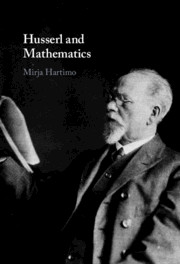Book contents
- Husserl and Mathematics
- Husserl and Mathematics
- Copyright page
- Dedication
- Contents
- Acknowledgments
- Abbreviations
- Introduction
- Chapter 1 From the Division of Labor to Besinnung
- Chapter 2 The Chimera of Logicism: Husserl’s Criticism of Frege
- Chapter 3 Clarifying the Goal of Modern Mathematics: Definiteness
- Chapter 4 Normativity of the Euclidean Ideal
- Chapter 5 Husserl’s Formal and Transcendental Logic (1929)
- Chapter 6 Gödel, Skolem, and the Crisis of the 1930s
- Chapter 7 Husserl’s Combination View of Mathematics
- Chapter 8 Kant and Husserl’s Critical View of Logic
- Epilogue A Look Ahead
- Bibliography
- Index
Chapter 5 - Husserl’s Formal and Transcendental Logic (1929)
Published online by Cambridge University Press: 29 July 2021
- Husserl and Mathematics
- Husserl and Mathematics
- Copyright page
- Dedication
- Contents
- Acknowledgments
- Abbreviations
- Introduction
- Chapter 1 From the Division of Labor to Besinnung
- Chapter 2 The Chimera of Logicism: Husserl’s Criticism of Frege
- Chapter 3 Clarifying the Goal of Modern Mathematics: Definiteness
- Chapter 4 Normativity of the Euclidean Ideal
- Chapter 5 Husserl’s Formal and Transcendental Logic (1929)
- Chapter 6 Gödel, Skolem, and the Crisis of the 1930s
- Chapter 7 Husserl’s Combination View of Mathematics
- Chapter 8 Kant and Husserl’s Critical View of Logic
- Epilogue A Look Ahead
- Bibliography
- Index
Summary
In this chapter, I will discuss Formal and Transcendental Logic (FTL) (1929) as a detailed example of Husserl’s usage of radical Besinnung. I will start by sketching an overview of Husserl’s involvement with mathematicians in the 1920s. At that time Husserl lived in Freiburg, where he did not have constant contact with mathematicians the way he had previously had in Göttingen. His most important sources seem to have been his former student and assistant Oskar Becker (1889–1964), some other students and followers, and the publications he had in his private library. Three books in mathematics published in the 1920s, and held in Husserl’s private library, contain markings that indicate that they were studied rather carefully (see Hartimo 2018c). These works, one by Hilbert and two by Weyl, will be discussed in detail in the first section of this chapter.
- Type
- Chapter
- Information
- Husserl and Mathematics , pp. 91 - 135Publisher: Cambridge University PressPrint publication year: 2021



